M&Ms: How to Unlearn
What else can Pavlov's dogs teach us in 110th edition.
One day in the late 1890s, Ivan Pavlov walked into his laboratory and put on his lab coat; he noticed something strange.
The dogs in his lab he had used to investigate the digestive system were wagging their tails and salivating.
But there was no food in sight.
That day Pavlov accidentally made the greatest discovery of his career.
Today his discovery is known as classical conditioning. The dogs, fed by Pavlov while he had lab coats on, had associated lab coats with food. The same association most humans, myself included, form with their weekly and bi-weekly paychecks today.
Then Pavlov tried bells rather than lab coats, and sure enough, the dogs produced more saliva than he knew what to do with after they had been trained, even with no food in sight.
When life gives you saliva and gastric fuilds, make salivonade? A concept we love in the Small Bets community is finding "sawdust" we can sell. Sawdust is the stuff you regularly throw away that is useless to you but turns out to be useful to someone else. Saliva and gastric juice from dogs seem pretty useless.
But staring at that juice Pavlov would normally throw away, he had a thought that led to a surprisingly lucrative side venture.
"More and more physicians were prescribing canine gastric fluids to patients suffering from dyspepsia, or indigestion, a practice that was swiftly spreading across Europe and overseas. The gastric juice was prized for its allegedly high histamine content. In other words, [Pavlov and team] were sitting on a potential goldmine. Pavlov discovered that hungry dogs were able to churn out over a quart of these precious fluids in just one day."—Ivan Pavlov: The Life and Legacy of the Famous Russian Psychologist.
The accidental side project was so profitable that it perpetually paid for 70% of the laboratory where Pavlov and his team researched.
"By the early 20th century, the laboratory was pushing over 3,000 two-pint vessels of canine gastric fluids each year"—Ivan Pavlov: The Life and Legacy of the Famous Russian Psychologist.
So let this little essay remind you to sell your extra, err, saliva.
But Pavlov was full of accidental discoveries.
In Poor Charlie's Almanac, Charlie Munger says one of the least known but most important discoveries Pavlov ever made is not classical conditioning but how to break classical conditioning. It is not so well known or documented because Russia had become full-on communist by this point.
"During the great Leningrad Flood of the 1920s, Pavlov had many dogs in cages. Their habits had been transformed, by a combination of his "Pavlovian conditioning" plus standard reward responses, into distinct and different patterns. As the waters of the flood came up and receded, many dogs reached a point where they had almost no airspace between their noses and the tops of their cages. This subjected them to maximum stress. Immediately thereafter, Pavlov noticed that many of the dogs were no longer behaving as they had."—Poor Charlie's Almanack
But once again, Pavlov accidentally discovered something incredible.
The way to break associations and reverse classical conditioning was through stress. Pavlov then spent the rest of his life stressing out dogs to confirm these findings empirically.
But I don't need Pavlov's research findings, perhaps dimmed by the communists in Russia that he despised, to understand stress reverses conditioning. I've seen it firsthand multiple times in my own life.
Take the last two years, of my life, for example; the stress of running out of runway and the fast pounding heartbeat in the middle of the night pushed me away from placing one big bet and into placing many small bets and surviving as an entrepreneur.
Everybody is trying to avoid stress at all costs. But Pavlov discovered stress is a way to reprogram the animal. It is a way to unlearn.
If you aspire to break the hold that some classical conditioning, like a big paycheck, has on you, as I did, then exposing yourself to some controlled stress may be one of the few ways I know to break it.
A story in a few tweets:
Alex went viral hard; this tweet now has over 5 million views.
But one of those three tweets is now deleted. (I'll let you guess which, ok I couldn’t help it and highlighted it.)
But this tweet highlights many important things about corporate America and a paycheck as far as Software Engineers are concerned.
My former colleague from Jet and good friend Leo highlights some good reasons why this all happens.
Then my friend Daniel in discussion with Paul Graham, adds a little more color to this.
Ultimately, a Startup in the traditional sense rarely fixes Alex's problem unless he starts it himself and raises the VC capital himself, and it succeeds.
Inventing inside a startup might get him promoted, as it did me many times back at Jet, but it would rarely make him wealthy. He would need a lot of equity for that, something reserved for founders and the first few people in.
I created many things while I was at Jet, and I got promoted for those things over and over, but ultimately my reward when Jet sold of $140k in equity, plus my salary for the years I was there, pales in comparison to what its founder made of $1 billion from equity alone. And I am not hating on the founder of Jet; he is an inspiration, and he took risks to get to that. I had to take less risk with my regular paycheck. I had less stress. Which is what Daniel is alluding to.
So the real answer to all this is to take some risk and make your own stuff if real wealth is the thing you're after.
Three Memes: Racing on Maps, Flirting with Communism, The Global Economy
Racing on Google Maps.
I am not a Cuban or Chinese immigrant, but as an immigrant from a communist country, I feel this meme, and I have tried hard to talk down my friends enthralled by that system.
A fascinating fact about the global economic recovery.
I love hearing from my readers; even if I don’t always have time to reply, I always read all replies.
-Louie




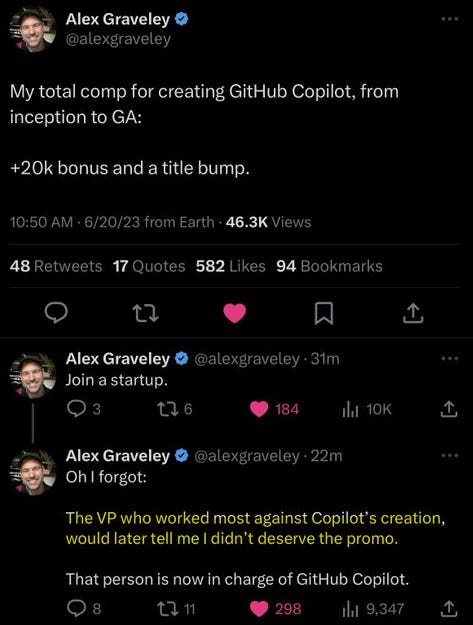
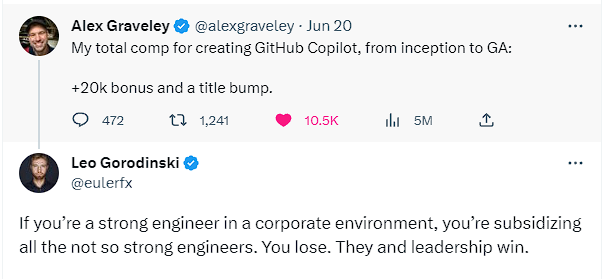
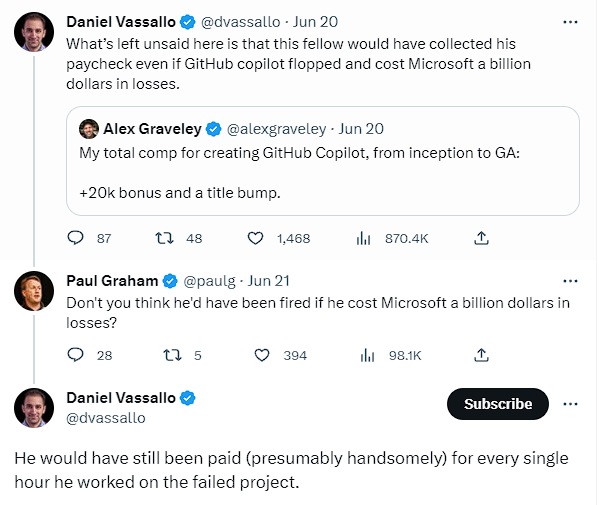
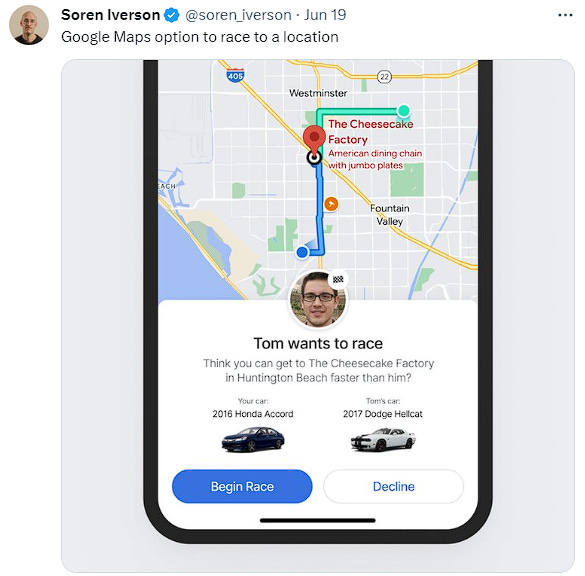

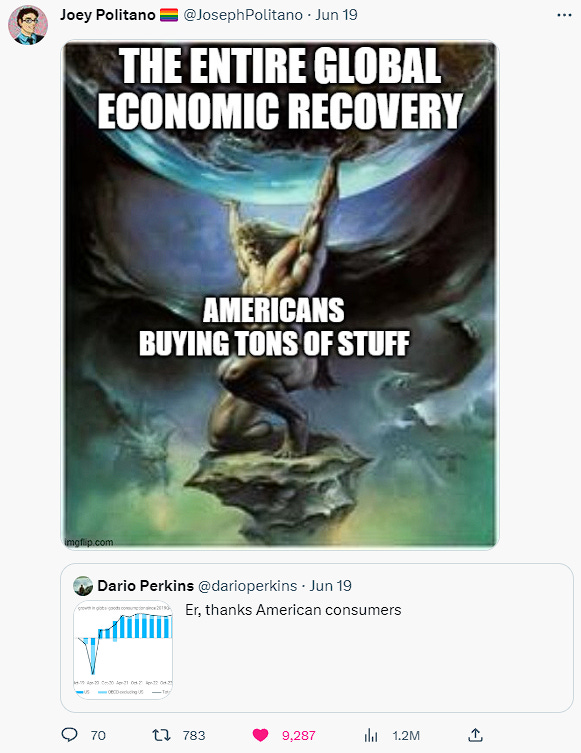
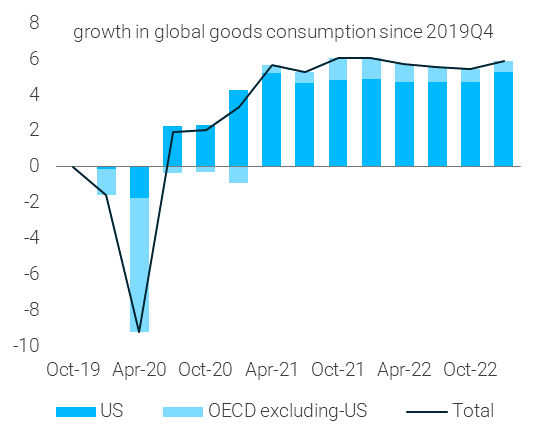
This saliva sales story is one of the most obscure and bizarre accounts of entrepreneurial inspiration I've ever heard.
Damn that’s a really obscure but insightful finding from Pavlov! Never knew stress kills conditioning. No wonder human being never change in comfort zones!